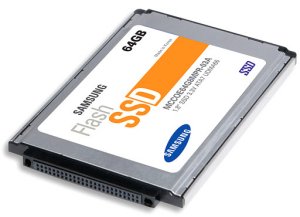
Posted on Monday, March 03 2008 @ 5:55 CET by Thomas De Maesschalck
Samsung
recently defended the reliability of solid state drives, while citing overwhelming growth expectations in the server market:
With no moving parts, SSDs avoid both the risk of mechanical failure and the mechanical delays of HDDs. Therefore, SSDs are generally faster and more reliable. The catch is the cost: SSDs are currently much more expensive than HDDs.
There are also concerns about wear. That is, flash has the potential to wear out after tens (or hundreds) of thousands of write cycles.
This characterization, however, is too simplistic, according to Michael Yang, flash marketing manager at Samsung. A flash device that is rated at 100,000 write cycles, for example, can write 100,000 times "to every single (memory) cell within the device," Yang said. In other words, the device doesn't write to the same cell over and over again but spreads out the writes over many different cells. This is achieved through "wear leveling," which is carried out by the SSD's controller, he said.
This would make it virtually impossible to wear out a flash chip. Yang said a pattern could be perpetually repeated in which a 64GB SSD is completely filled with data, erased, filled again, then erased again every hour of every day for years, and the user still wouldn't reach the theoretical write limit. He added that if a failure ever does occur, it will not occur in the flash chip itself but in the controller.
On another topic, Yang cited explosive demand in the enterprise server market that caught his company by surprise. "At first it just sounded like an interesting idea," he said. But then demand took off. As Yang explained, companies like Citibank and American Express peg server performance on IOPS or input/output operations per second. "HDDs do 120 to 150 IOPS. SSDs 10,000 to 30,000 IOPS." Because of this overwhelming speed advantage many large corporate customers are opting for SSDs, despite the significant price premium SSDs command compared with HDDs.
Samsung predicts SSD prices will drop 35-45 percent this year.
